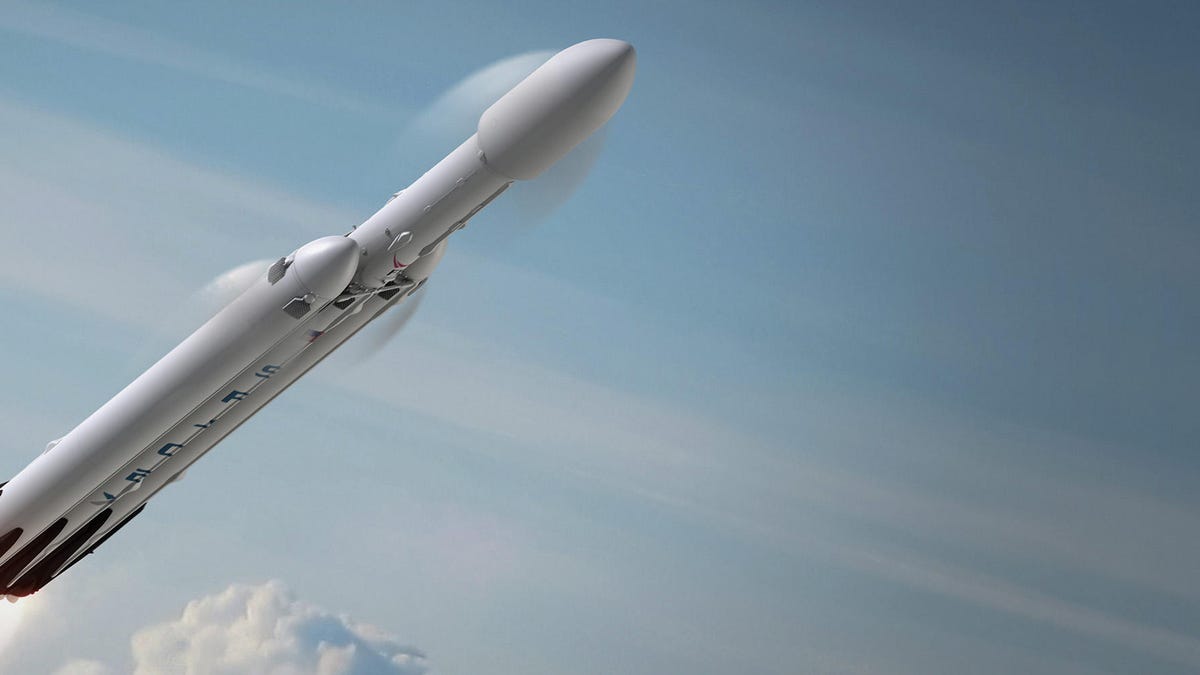SpaceX's huge Falcon Heavy rocket could end 2017 with a bang
Elon Musk's company is still hoping to launch a new generation of monster rockets by the end of the year, even if they don't get too far off the ground.

Falcon Heavy could be the most powerful rocket in the world very soon.
The next big rocket from SpaceX has been years in the making, and the company is still hoping Falcon Heavy will finally get off the ground in 2017.
A report on NASASpaceFlight circulated on Wednesday claiming SpaceX is targeting mid-December for the first static-fire tests of what it claims will become the most powerful rocket in use anywhere in the world. If successful, the tests could be followed by the first launch of Falcon Heavy as soon as Dec. 29, the report said.
SpaceX would not confirm that it's set a targeted launch date for the maiden voyage of Falcon Heavy, which will be a little like taking the company's popular Falcon 9 rocket and strapping a second and third Falcon 9 first-stage booster to each side of a central main rocket.
However, SpaceX CEO Elon Musk has spoken over the past several months about his hope that Falcon Heavy will launch "hopefully towards the end of the year," and the company website also says 2017 is still the target date for its virgin launch. So, if it doesn't happen Dec. 29, well, there are only two other launch date options to meet that 2017 target.
If successful, the first launch and landing should be quite a sight. Musk says the two side booster rockets should return to land at Cape Canaveral, while the center rocket would land at sea on a drone ship.
Side booster rockets return to Cape Canaveral. Center lands on droneship.
— Elon Musk (@elonmusk) July 28, 2017
The setup packs enough power to lift a fully loaded 737 jet into orbit. The last rocket that could carry that much weight was the Saturn V moon rocket that took Apollo astronauts to the moon.
SpaceX's Falcon Heavy is designed to be able to carry humans into space, something Musk's company has yet to do. But first it will likely be used to haul some heavier satellites and unmanned craft into space. The company currently has four planned launches on its manifest that are scheduled to use Falcon Heavy.
Aside from sending big stuff into orbit, another key selling point for the Falcon Heavy, according to Musk, is that it will restore the possibility of sending humans beyond the International Space Station, perhaps to the moon or even Mars.
And, of course, Musk's master plan is to use Falcon Heavy as a bridge to an even bigger effing rocket (really, the rocket is called "BFR") that will carry loads of colonists to the Red Planet.
But first, we have to see if SpaceX can get the first demonstration launch of its next-generation rocket off the ground by the end of the year. Musk has been sure to set expectations low.
"There's a lot of risk associated with Falcon Heavy, a real good chance that that vehicle does not make it to orbit," Musk said at the International Space Station Research and Development Conference in July. "I hope it makes it far enough beyond the pad so that it does not cause pad damage ... it's guaranteed to be exciting."
Crowd Control: A crowdsourced science fiction novel written by CNET readers.
Technically Literate: Original works of short fiction with unique perspectives on tech, exclusively on CNET.

